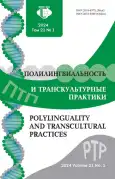Природа ошибки в русской речи будущего билингвального учителя русского языка: психолингвистический и лингвометодический подходы к интерпретации экспериментальных данных
- Авторы: Медведева Н.В.1
-
Учреждения:
- Пермский государственный гуманитарно-педагогический университет
- Выпуск: Том 21, № 1 (2024)
- Страницы: 83-98
- Раздел: Билингвальное образование
- URL: https://journal-vniispk.ru/2618-897X/article/view/326947
- DOI: https://doi.org/10.22363/2618-897X-2024-21-1-83-98
- EDN: https://elibrary.ru/YETFVQ
- ID: 326947
Цитировать
Полный текст
Аннотация
Актуальность исследования обоснована необходимостью анализа ошибок в русской речи естественного инонационально-русского билингва коми-пермяка на основе специфики процессов его речевой деятельности. Феномен «ошибка» трактуется на основе психолингвистического подхода как следствие сбоев в механизмах речевой деятельности билингва и лингвометодического подхода как факт нарушения нормативности для определения инструментария совершенствования русской речи билингвальной личности. Термин «ошибка» в речи обусловлен классическим понятием нарушения и считается в достаточной мере разработанным и описанным в разных аспектах. Материалами исследования послужили экспериментальные данные: ошибки в письменной и устной русской речи билингвальных студентов коми-пермяков на занятиях лингвометодического цикла. Методами исследования являются метод непосредственного наблюдения за русской речью билингвального студента коми-пермяка, анализ его письменных работ и устных высказываний, интерпретация ошибок в психолингвистическом и лингвометодическом аспектах. Результаты исследования подтверждают гипотезу: природа ошибок в русской устной и письменной речи инонационально-русского билингва психолингвистическая, проявляющаяся на всех уровнях билингвальной личности в межъязыковых взаимодействиях систем родного и русского языков, определяющих работу механизмов речевой деятельности на русском языке. Совершенствование русской речи инонационально-русского билингва требует разработки эффективного лингвометодического инструментария для обучения.
Об авторах
Наталья Владимировна Медведева
Пермский государственный гуманитарно-педагогический университет
Автор, ответственный за переписку.
Email: basha_n@mail.ru
ORCID iD: 0000-0002-0152-2922
кандидат филологических наук, доцент, доцент кафедры общего языкознания, русского и коми-пермяцкого языков и методики преподавания языков
Российская Федерация, 614990, Пермь, ул. Сибирская, 24Список литературы
- Zalevskaya, A.A. 2009. Questions of psycholinguistic theory of bilingualism. Questions of psycholinguistic, no. 10, pp. 10–17. (In Russ.)
- Zalevskaya, A.A. 2009. Speech error as a tool for scientific research. Questions of psycho-linguistic, no. 9, pp. 6–22. (In Russ.)
- Kapinos, V.I., Sergeeva, N.N., and Soloveichik, M.S. 1991. Speech development: theory and practice of teaching: 5–7 grades: teacher’s book. Moscow: Prosveshchenie publ. print. (In Russ.)
- L’vov, M.R. 1988. Dictionary-reference book on the methodology of the Russian language: a textbook for students of pedagogical institutes in the specialty. Moscow: Prosveshсhenie publ. print (In Russ.)
- Ovchinnikova, I.G., and A.V. Pavlova, 2016. Translation bilingualism. Based on written translation errors. Moscow: FLINTA: Nauka publ. print (In Russ.)
- Panov, M.V. 1985 Teaching Russian spelling and punctuation to students of schools of the peoples of the Finno-Ugric group. Leningrad: Prosveshсhenie publ. print (In Russ.)
- Privalova, I.V. 1995. Errors in translation under the influence of a psychological attitude. Funktsionirovanie yazykovykh edinits v raznykh formakh rechi, pр. 59–64. (In Russ.)
- Tsejtlin, S.N. 1982. Speech errors and their prevention: A guide for teachers. Moscow: Prosveshchenie publ. print (In Russ.)
- Ceytlin, S.N., and T.A. Kruglyakova. 2019. The nature of speech errors of multi-language schoolchildren, pp. 103–112. (In Russ.)
- Karaulov, Ju.N. 2010. Russian language and linguistic personality. 7-th ed. Moscow: LKI publ. print (In Russ.)
- Kozhina, M.N., Duskaeva L.R., and Salimovskii V.A. 2010. Stylistics of the Russian language: textbook. Moscow: FLINTA: Nauka publ. print (In Russ.)
- Leont’ev, A.A. 1970. Some problems of teaching Russian as a foreign language (psycho-linguistic studies). Moscow: Moskovskii universitet publ. print. (In Russ.)
- Kuznetsova, T.D. 1981 The role of goal in the formation of correct and erroneous speech in the conditions of bilingualism and trilingualism: dissertation.. candidate of psychological sciences. Almaty. http web. (In Russ.)
- Gokhlerner, M.M., and G.V. Eiger. 1990. Mechanisms of controlling the linguistic correctness of a statement. Kharkov: Osnova publ. print. (In Russ.)
- Debrenn, M. 2007. Interlingual deviatology: errors of generation and understanding. NGU Journal; linguistics and intercultural communication. https://cyberleninka.ru/article/n/mezhyazykovaya-deviatologiya-oshibki-porozhdeniya-i-ponimaniya. Web (In Russ.)
- Tsypanov, E.A. 2015. Vidza olan, komi kyv! Syktyvkar: Kola publ. print. (In Russ.)
- Batalova, R.M., and A.S. Krivoshchekova-Gantman. 1985. Komi-Permyak-Russian Dictionary: about 27.000 words. Moscow: Russkii yazyk publ. print. (In Russ.)
- Ozhegov, S. I., and N.Ju. Shvedova, eds. 1985. Dictionary of the Russian language. 17-th ed. Moscow: Stereotip publ. print. (In Russ.)
- Fedunev, G.V. (editor). 1998. Komi language: encyclopedia: A–Z / Ministry of education and higher education. Rep. Komi, RAS, Ural. department, Komi Scientific Center. Institute of Language, Literature and History. Moscow: Publishing House of DIK, 607 p.
Дополнительные файлы









